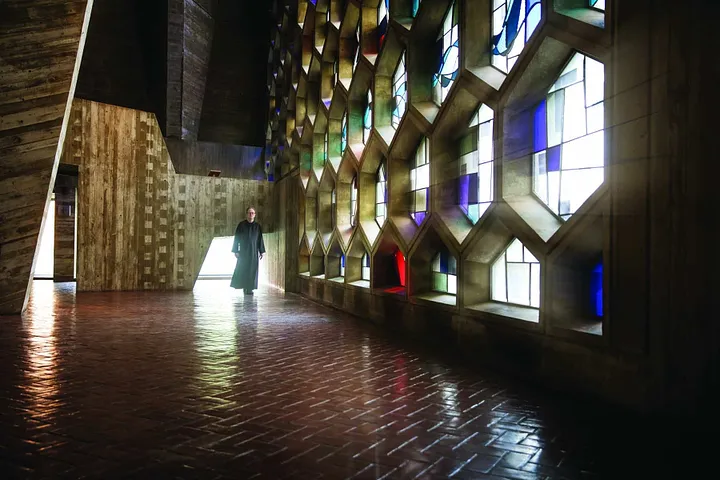September 2, 2024
Happy Monday and Happy Labor Day, my friends! While most of us welcome today as a day off work or perhaps mourn it as the last day to wear seersucker until Easter—yes, in some places that’s (still) a thing—today honors the organized labor movement and the American worker. Unlike much of the rest of the world, the United States does not officially recognize or celebrate International Workers’ Day on May 1, but the idea of celebrating workers and labor has been used by politicians and political parties since the dawn of those parties. The American worker, regardless of their trade, occupation, or industry, has been and continues to be used, to borrow a quote from Bob Dylan, as a “pawn in their games” by politicians who have little fealty to workers and in many cases have arrived at their positions by exploiting those very workers.
In the chapel at Rosemont College in Pennsylvania, there is a stained-glass window dedicated to the “Dignity of Labor” (below left). Bees and a hive are used to depict the quiet unity of workers dedicated to their tasks and their production. This motif is also used in the design of the abbey church at St. John’s Abbey in Minnesota where the stained-glass windows are arranged in a honeycomb pattern (below right). In both cases, the intended message is unity and working towards common goals.
Yet, beyond these religious spaces, work and labor has been cheapened and marginalized. Strict capitalism would have us believe that a company should be able to offer any compensation in exchange for labor. If no one will work for that compensation, then that company shouldn’t be prevented from seeking labor in other markets (read: countries). This cycle leads directly to poverty until workers need government assistance even to buy the cheaply made products at supposedly low prices that their own employer sells. Imagine working full time and still needing help to purchase the necessities of life at the very store that employs you.
Lest we continue to incorrectly attribute this situation to the Industrial Revolution, late 20th century consumerism, or early 21st century late-stage capitalism alone, we must remember that the first step in the devaluing of labor in the territory that has become the United States was the institution of chattel slavery.
Everyone has their own solutions to this problem. Some of those solutions are nuanced and realistic, others are radical—tear down capitalism, eat the rich, and viva la revolution! Others are gripes about entitled youth (every generation says that) or about people who have never done “an honest day’s work.” If “an honest day’s work” is farming, construction, a skilled trade, a factory job, food service, and maybe retail, then I’ve rarely done an honest day’s work. Recently, a speaker at the Republican National Convention put it this way: “Workers who take showers at the end of the day rather than the beginning of the day.” Regardless of our background and the occupations we’ve held, Labor Day reminds us all that the safety and dignity of workers everywhere is a shared goal and collective good.
What does honest work mean to you? How have you seen work and labor devalued?
In lieu of a prayer this week, I commend this recording of “So God Made a Farmer” by Paul Henry to you.
(Yes, this video and Henry’s words are dated. Just as there have always been men who refuse or are incapable of making their own lunches and instead wait for their wives to do something so rudimentary as to make one wonder how the United States has sustained a food system; anyone can be a farmer. Anyone can host the local “ladies.” These are not roles reserved for specific genders or for heterosexuals. There have always been Queer farmers. There have always been strong, powerful women and nonbinary folks doing heavy, dirty jobs on farms. Indeed, one of the three Queer fantasies that all Queer people share is owning a farm where you live with all your friends.)
Blessings on your weeks and your work, my friends! Let me know if there is anything I can do for you.
Faithfully,
Ben




Comentarios